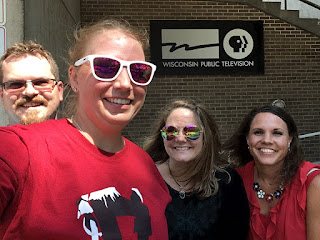Until You KNOW What You Don't Know
Inspired by the blog entry: The Career Choice Nobody Tells You About by Tim Brown (CEO at IDEO)
Learning happens because we accept what we don't know and we make it a goal to figure it out.
What I find interesting at edcamps and unconferences, especially newer ones or ones that have a lot of first time attendees, is the crickets that you hear in the room during the pitch and plan. Unless you are intentionally engaging in conversations, reading, and connecting, you might not be aware of some of the rapid changes and buzzwords that are circling around in education.
One of the greatest things I did for my career as a science educator was crash the social studies teach like a pirate chat #sstlap. It is true, the magic really does happen outside of your comfort zone. In order to know what we don't know, we must take a step out... For me this was learning how to engage students through social studies.
Often times we naturally fall into content area collaboration. Where I think the magic really happens is when we collaborate interdisciplinarily and when students are provided these same learning opportunities. We are asking our students to exercise their creativity, to be collaborators, communicators, problem solvers, and critical thinkers. Are students going to be able to do that thinking linearly?
How do we get there? We get there through providing personalized learning opportunities for students so that they too can see the connection. Let's focus on the skills and standards and use our learning targets and content to be the vehicle to drive the learning. Are we asking students to memorize content, or inspiring life long learners who seek out their own learning opportunities?
I have had the opportunity to witness and support this in action over the past few months and I could not be more impressed with the quality and engagement of both students and teachers. I am a better teacher by witnessing and participating in this collaboration, which allows me to be a better teacher for my students in our classroom.
Growing up I was not a strong, nor passionate writer. I was that procrastinator that waited till the last minute hoping that the words came to me and spilled out onto the page. I had to make sure I used every moment to plan before it came together. Today, I grow by writing.
CHALLENGE: I encourage you to take a step out of your comfort zone and venture into exploring and learning something new outside of your content area whether it involves collaborating with another discipline, or crashing a twitter chat outside of your content area.
Learning happens because we accept what we don't know and we make it a goal to figure it out.
What I find interesting at edcamps and unconferences, especially newer ones or ones that have a lot of first time attendees, is the crickets that you hear in the room during the pitch and plan. Unless you are intentionally engaging in conversations, reading, and connecting, you might not be aware of some of the rapid changes and buzzwords that are circling around in education.
One of the greatest things I did for my career as a science educator was crash the social studies teach like a pirate chat #sstlap. It is true, the magic really does happen outside of your comfort zone. In order to know what we don't know, we must take a step out... For me this was learning how to engage students through social studies.
What really evolved from this opportunity was for me to discover that I am not only responsible for the science content that I teach, I am responsible for teaching kids. This means that I'm also responsible for students becoming responsible citizens, mathematicians, writers, readers, online content creators, digital citizens, etc. A tremendous value exists for our students when we teach our content with a different lens.
Often times we naturally fall into content area collaboration. Where I think the magic really happens is when we collaborate interdisciplinarily and when students are provided these same learning opportunities. We are asking our students to exercise their creativity, to be collaborators, communicators, problem solvers, and critical thinkers. Are students going to be able to do that thinking linearly?
How do we get there? We get there through providing personalized learning opportunities for students so that they too can see the connection. Let's focus on the skills and standards and use our learning targets and content to be the vehicle to drive the learning. Are we asking students to memorize content, or inspiring life long learners who seek out their own learning opportunities?
I have had the opportunity to witness and support this in action over the past few months and I could not be more impressed with the quality and engagement of both students and teachers. I am a better teacher by witnessing and participating in this collaboration, which allows me to be a better teacher for my students in our classroom.
Growing up I was not a strong, nor passionate writer. I was that procrastinator that waited till the last minute hoping that the words came to me and spilled out onto the page. I had to make sure I used every moment to plan before it came together. Today, I grow by writing.
CHALLENGE: I encourage you to take a step out of your comfort zone and venture into exploring and learning something new outside of your content area whether it involves collaborating with another discipline, or crashing a twitter chat outside of your content area.




.JPG)
Comments
Post a Comment